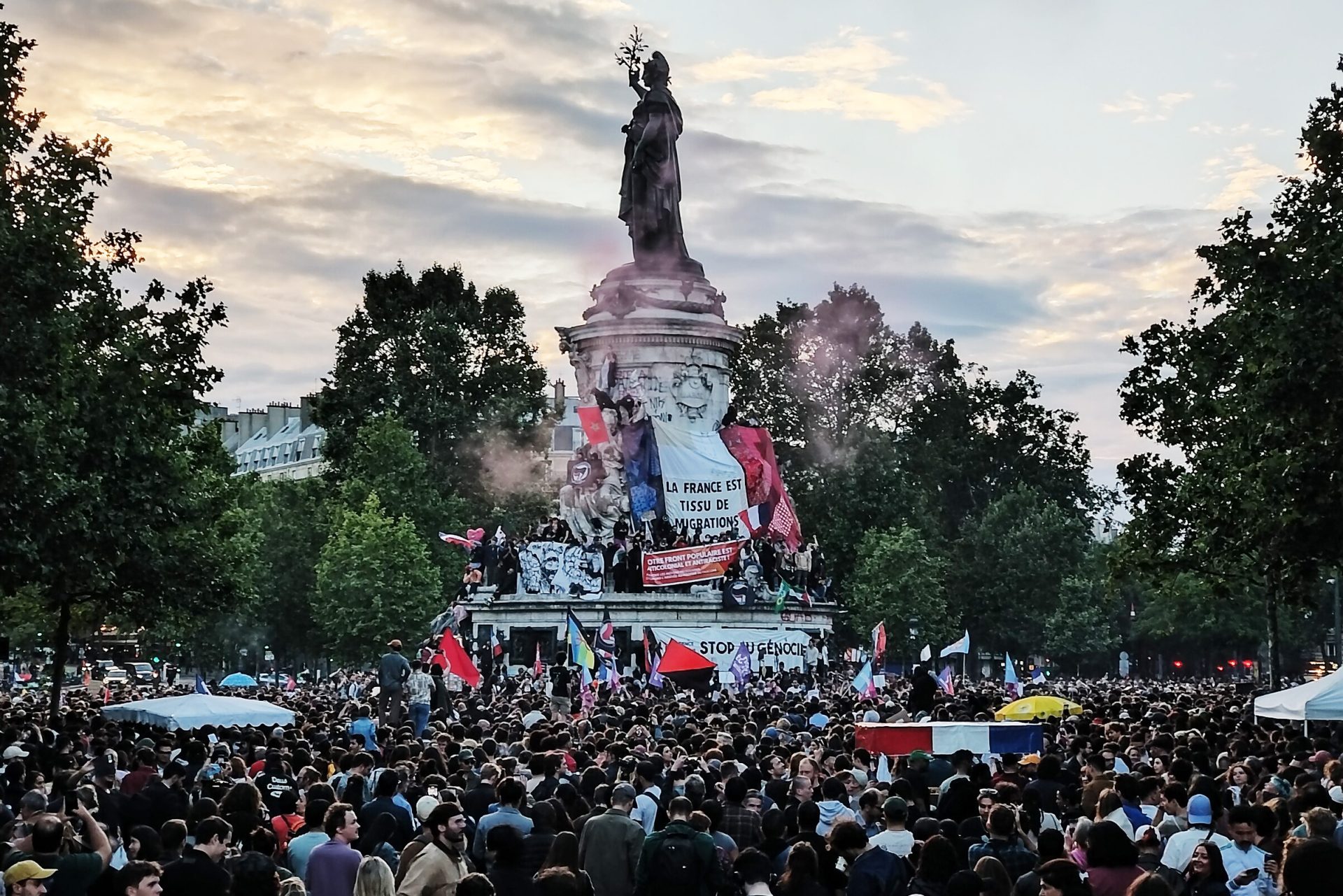
The results of the second round of the French legislative elections brought joy and, above all, relief to millions of voters who feared a victory for the far-right National Rally (RN) bloc.
[Originally published in French at marxiste.org]
The day after the first round, RN leader Marine Le Pen and party president Jordan Bardella were already planning their ‘future’ government, with the names of ‘future’ ministers leaked to the press. They were so confident in their victory that they postponed their ‘social’ programme indefinitely. ‘Initially’, they explained, they would pursue a policy of budgetary austerity and retirement at 66. But last night, their plans all exploded in mid-air. With 143 deputies, the RN-Ciotti alliance is far from an absolute majority.
With 184 seats, the left-wing New Popular Front (NFP) came first – ahead of the Macronist group (166 seats). This was therefore a heavy defeat for the ‘presidential majority’, but not the debacle that was looming the day after the European elections. The Macronists (or ex-Macronists) achieved a better performance than that predicted in recent days by the pollsters, even after taking into account the withdrawal of NFP and Macronist candidates between the two rounds as part of the so-called Republican Front.
We will return elsewhere to detail our categorical rejection of the so-called ‘Republican Front against the extreme right’: a policy of class collaboration which, far from weakening the right and the extreme right, strengthens them. Here, let us only emphasise that, in terms of seats won, the ‘Republican Front’ mainly benefited the Macronist right (and the traditional right-wing Les Républicains, LR, who also outperformed the polls). The numerous withdrawals of NFP candidates saved the outgoing ‘majority’ from a total rout – and allowed LR to win a few additional seats.
In the end, the ‘Republican Front’ mainly had the effect of giving an advantage to the Macronists and the Republicans, against the RN. However, it would be completely wrong to conclude that the RN is politically weakened. Not only did the RN collect, in the first round, six million more votes than in 2022, but the alliance between the NFP and the right in between the two rounds, can only strengthen the ‘anti-establishment’ image of Marine Le Pen and her henchmen, who intend to reap the rewards, perhaps sooner rather than later.
Mobilise in the streets and workplaces!
The NFP came first (184 seats), but was far from achieving an absolute majority (289 seats). There is therefore no majority in the National Assembly to vote for the NFP programme. This means that, on the basis of the composition of the National Assembly alone, the constitution of an even somewhat ‘solid’ government is a challenge. Far from being over, the deep political crisis that began on 9 June is entering a new phase.
The negotiations and haggling behind the scenes will multiply over the coming days and weeks. Already, leaders of the Socialist Party (PS) and the Greens declare themselves willing to renounce the NFP programme to find agreement with the Macronists. As for the French bourgeoisie, it will exert maximum pressure to force the next government – whoever it may be – to pursue a ‘responsible’, that is to say, austerity, policy.
La France Insoumise (LFI) leader Jean-Luc Mélenchon has asked Macron to appoint a Prime Minister from the NFP. He also asks that whoever it may be should be prepared to form a government that would apply the entire NFP programme, without negotiating anything with the Macronist deputies. This position contrasts sharply with that of several leaders of the right wing of the NFP. But it is the latter who will be at the centre of negotiations and haggling.
Given the internal balance of power in the National Assembly (and within the NFP), what Mélenchon demands has no chance of being achieved in the absence of a powerful extra-parliamentary mobilisation of young people and workers. The focus of the struggle is no longer in the National Assembly, but in the streets, in the workplaces, and in working-class neighbourhoods.
It is true that the NFP does not have an absolute majority in the National Assembly. But workers are the vast majority in the country. They constitute, by far, the decisive social force. Without their kind permission, not a wheel turns and not a lightbulb shines. In the coming days, the leaders of LFI and the CGT union confederation – among others – must put mass mobilisations on the agenda, including renewable strikes, to demand the implementation and deepening of the NFP programme.
On the basis of a revolutionary mobilisation of youth and workers, it would be possible not only to apply all of the progressive measures of the NFP programme, but even to go much further – up to the expropriation of the big capitalists. We must put an end to the domination of the economy by a handful of giant parasites who impose austerity, precarity, unemployment and many other scourges on the overwhelming majority of the population. They must be overthrown. Workers must be brought to power and the economy must be reorganised on the basis of the democratic planning of the productive apparatus.
This is the only way to put an end to permanent social decay and decline – and, in the process, to truly and definitively halt the rise of National Rally.

